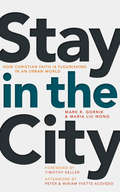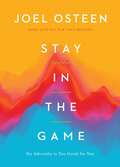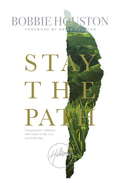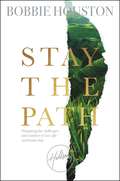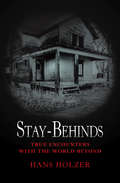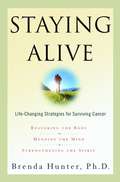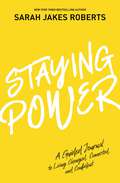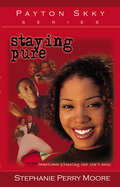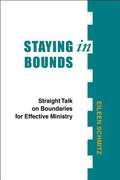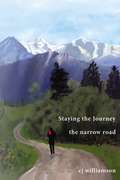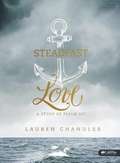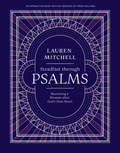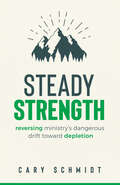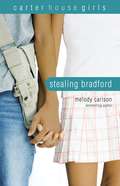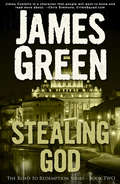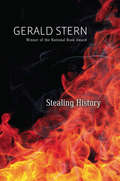- Table View
- List View
Stay in the City: How Christian Faith Is Flourishing in an Urban World
by Mark R. Gornik Maria Liu WongWe live in an urban age. To a degree unprecedented in human history, most of the world's people live in cities. It is thus vital, say Mark Gornik and Maria Liu Wong, for Christians to think constructively about how to live out their faith in an urban setting. In Stay in the City Gornik and Liu Wong look at what is happening in the urban church—and what Christians everywhere can learn from it. Once viewed suspiciously for their worldly temptations and vices, cities are increasingly becoming centers of vibrant Christian faith. Writing from their experience living and working in New York City, Gornik and Liu Wong invite readers everywhere to join together in creating a more flourishing—and faith-filled—urban world.
Stay in the Game: No Adversity Is Too Great for You
by Joel OsteenTap into the strength and power to overcome every obstacle that tries to keep you on the sidelines of life! You were designed to be strong, to be full of can-do power, not a fainter or a quitter, not lacking or weak. You have been equipped with strength to defeat every challenge. When you go through disappointments, hurts, and unfair situations, it&’s easy to get discouraged, to throw in the towel and give up. But you can&’t sit on the sidelines of life nursing your wounds, feeling weary and defeated. In spite of the pain, in spite of the adversity, you need to look those obstacles in the eye and say, &“You&’re no match for me. I am ready for and equal to anything that comes my way. I can handle this.&” This compact digest by #1 New York Times bestselling author Joel Osteen helps you put on a victor&’s mind-set so that one day soon you won&’t just be in the game but you&’ll be living a life of victory. Derived from material previously published in The Power of I Am and Break Out!
Stay the Path: Navigating the Challenges and Wonder of Life, Love and Leadership
by Bobbie HoustonGod calls all women to some level of leadership. Yet seeing yourself as a leader, discerning what one is meant to do, and navigating one's role as a woman and leader can be a challenging task. Drawing on the wisdom of 40 years of ministry, Bobbie Houston helps all women to discover their specific purpose and divine calling in STAY THE PATH. She shares the truths and experiences that have kept her and her husband, Brian Houston, on course, on point and focused on the path before them. Readers will be able to recognise and believe in their unique gifts. Packed with personal stories, helpful advice and leadership strategies for women, this book will challenge readers to claim their God-given potential and lead with confidence, poise, and grace.
Stay the Path: Navigating the Challenges and Wonder of Life, Love, and Leadership
by Bobbie HoustonGod calls all women to some level of leadership. Yet seeing yourself as a leader, discerning what one is meant to do, and navigating one's role as a woman and leader can be a challenging task. Drawing on the wisdom of 40 years of ministry, Bobbie Houston helps all women to discover their specific purpose and divine calling in STAY THE PATH. She shares the truths and experiences that have kept her and her husband, Brian Houston, on course, on point, and focused on the path before them. Readers will be able to recognize and believe in their unique gifts. Packed with personal stories, helpful advice, and leadership strategies for women, this book will challenge readers to claim their God-given potential and lead with confidence, poise, and grace.
Stay-Behinds: True Encounters With The World Beyond (True Encounters with the World Beyond #9)
by Hans HolzerParanormal expert Hans Holzer investigates some of the strangest and most difficult cases of loved ones who are simply not ready to leave their earthly lives The &“stay-behind,&” a term coined by professor Hans Holzer, is a ghost who is not prepared to move to the &“other side,&” but prefers to remain among loved ones and its former home. In Stay-Behinds, Holzer reveals some of the most famous cases of these beings, including the haunting of Rose Hall Plantation in Jamaica and the strange case of Mrs. C.&’s late yet lively husband.
Stay: Love Beyond Grasp
by Jay OlceStay is a book for people of all ages and genders. It's not a teenage romance, it's not a beautiful lovestory, it's something beyond our comprehension. A young couple is going through the hardships of their teenage years, but above all, they believe in their love. But love isn't always flowers, and some things in life can't be avoided, especially a pregnancy from a later boyfriend. Those who love, however, know when to wait and when to pursue. You'll see all of this in this brief story, which involves something we can't really grasp ourselves.
Staying Alive: Life-Changing Strategies for Surviving Cancer
by Brenda HunterHeal Your Body, Embrace Your Life. Few things are more frightening, confusing, or devastating than a diagnosis of cancer. If you or someone you love has cancer (or is at risk for it), you want reliable information, reasons for hope, and a plan of attack you can trust. Staying Aliveprovides this and more. A six-year cancer survivor, psychologist, and cancer coach, Dr. Brenda Hunter presents the program that has contributed significantly to her survival, as well as interviews with cancer experts and long-term survivors. Inside you’ll find: • life-changing strategies for beating cancer • an integrated, holistic approach to cancer care and survival that involves body, mind, and spirit • success stories and survival strategies from long-term cancer survivors • a proactive nutritional program designed to empower you and increase wellness • interviews with national cancer experts The good news? The human body has an amazing capacity to heal itself when life-changing strategies are applied. Dr. Brenda Hunter suggests that many of us can work to reverse–or prevent–cancer’s destructive course. Learn how you may be unnecessarily putting yourself at increased risk, and discover the steps you can taketodayto begin to restore or protect your health. A Cancer-Conquering Plan for Your Body, Mind, Emotions,andSpirit
Staying Power: A Guided Journal to Living Changed, Connected, and Confident (A Power Moves Experience)
by Sarah Jakes RobertsDiscover your true power as you embrace the calling God has reserved just for you.Does the pressure to do more, be more, and achieve more leave you feeling powerless?In Staying Power, global ministry leader and New York Times bestselling author Sarah Jakes Roberts challenges you to let go of others' expectations and embrace the calling God has for you--with the power only He can give.In this empowering guided teaching journal, you'll engage with the key themes and messages from Sarah Jakes Roberts' Power Moves, as well as take time for self-reflection through insightful questions and journaling prompts. Drawing on truths from her book, Power Moves, Sarah helps you:Bring your authentic self back to lifeConnect with God in new waysDisarm the fear that holds you backUnderstand how worthy, valuable, and loved you areRelease your power to the world Ideal for personal enrichment and for gifting, this guided journal includes: Bible passages for each chapter to help you ground your spirit in ScriptureThought-provoking messages from Sarah to stir your soul and inspire you to actionQuestions for self-reflection to help you cultivate personal growthGuided prompts to help you explore your experiences and feelingsSpace to write your ideas and insights so you can track your progress and spiritual maturity Staying Power equips you to align your heart and mind to receive what is already yours. True power rests in authenticity, bravery, and commitment to continuous growth. Come be refilled, restored, and refueled as you harness the power God has reserved just for you
Staying Pure (Payton Skky Series #1)
by Stephanie Perry MoorePayton Skky is beautiful and popular and dating Dakari Graham, the most attractive and desirable guy in their Georgia high school. The problem? He wants to have sex with her while she wants to obey God and stay pure until marriage. With pressures coming from all sides, Payton begins to wonder if waiting is really worth it. When he breaks it off with her for a more willing girl, Payton's world crashes down on her. As she struggles to answer these questions and gets to know Tad Taylor, Payton realizes that following God is the real secret to staying pure.
Staying Pure (Payton Skky Series #1)
by Stephanie Perry MoorePayton Skky is beautiful and popular and dating Dakari Graham, the most attractive and desirable guy in their Georgia high school. The problem? He wants to have sex with her while she wants to obey God and stay pure until marriage. With pressures coming from all sides, Payton begins to wonder if waiting is really worth it. When he breaks it off with her for a more willing girl, Payton's world crashes down on her. As she struggles to answer these questions and gets to know Tad Taylor, Payton realizes that following God is the real secret to staying pure.
Staying Stylish
by Candace Cameron BureJoin Candace Cameron Bure, actress best known as D.J. Tanner from Full House and a New York Times bestselling author, whose faith and wit have delighted audiences for decades, as she lets you in on her best-kept secrets for Staying Stylish. This gorgeous manual for beauty, style, health, and spiritual wellness will be your one-stop shop for everything you need to live your most stylish life. As an actress, producer, New York Times bestselling author, and inspirational speaker, Candace Cameron Bure has spent her entire life in the spotlight, and she is well aware of the pressures and forces many women face. Throughout her career, Candace has balanced her faith, family, and passion for work and found her spot as role model to women of all ages—and as a style icon.In her brand-new book Staying Stylish, Candace invites you behind the scenes of her day-to-day life and shares over 100 tips and tricks for looking and feeling your best—both inside and out. Nurture your body, style, and soul as you read through this beautiful book full of photos, insider secrets, and exciting ideas to revamp your own life into its best possible version. She offers her insight into balance, spiritual growth, and looking great while doing it all.Staying Stylish topics will include personal style, fresh hair and makeup for any age, a well-balanced diet and fitness regime, and a well-nourished spirit.
Staying in Bounds: Straight Talk on Boundaries for Effective Ministry
by Eileen SchmitzBoundaries are healthy and necessary parts of life and ministry. Staying in Bounds provides straight-talk guidance to ministers and other leaders of churches and faith-based organizations on the what, why, and how of relational boundaries. Provides guidance on identifying, implementing, and enforcing healthy boundaries, with a special focus on ministry settings. The author develops the concept of boundaries from psychological and theological perspectives, discusses the benefits of boundaries, and then explains the importance of healthy boundaries in the church.
Staying the Journey: The Narrow Road
by CJ WilliamsonGiven all of life&’s distractions in this current culture, it is difficult to walk the narrow road. Between the desire to live a comfortable life we often make spiritual sacrifices that are detrimental to our overall spiritual health. Before we know it, we have widened the narrow road beyond recognition. The only problem is God doesn&’t widen His vision of the same road. So, together looking back at heroes of the faith mixed with personal stories of struggle and victory, this book will enhance your ability at staying the journey of the narrow road.
Steadfast Love: A Study of Psalm 107
by Lauren ChandlerThere are times when worship overflows effortlessly from a heart full of gratitude and praise. And there are times when God seems far and we feel we have nothing to offer. Throughout it all, God shows us His steadfast love. Psalm 107 is a call to worship. It reminds us that each season of life is an opportunity to reveal the anchor of our souls. In this 7-session Bible study, learn to face both storms and deserts with courage and trust in Jesus, and discover how tests in our journeys of faith reveal the true condition of our hearts. For there is no fear for the one who fears the Lord, the one whose soul is anchored in His steadfast love.
Steadfast Love: The Response of God to the Cries of Our Heart
by Lauren Chandler"Sometimes He wrings the worship from our hearts." There are times when worship overflows easily and effortlessly from a heart full of gratitude and praise. Yet, there are other times when God seems far and we feel we have nothing left to offer. We are tired, or thirsty, or imprisoned in our own chains through our own devices, or caught in the waves of a tumultuous sea. This is when God shows us His steadfast love. He wraps His eternally powerful, ultimately creative, nail-scarred hands around our hearts and squeezes with appropriate might—yielding an honest plea for Him to save us and deliver us from our circumstances, fears, and self control. And He does. He initiates with His steadfast love, and responds with the same. Walk with Lauren as she shares what she has learned of the steadfast love of the Lord.
Steadfast Mercy: Abiding Mercy, Arms Of Mercy, Steadfast Mercy (An Amish Mercies Novel #3)
by Ruth ReidShe&’d told herself she&’d never go back home. But that was before the accident—before life changed forever.After the tragic death of her parents, Jonica Muller must return to the Amish community she left in shame. Tasked with settling her father&’s estate, she plans to keep her visit as brief as possible so she can return to start a life with Ephraim, a widower who has offered her and her five-year-old son the stability of a family.But Jonica&’s childhood home in Posen, Michigan, won&’t let her go so quickly. Her father&’s sister, Aenti Edna, is showing signs of a slipping mind. To Jonica&’s alarm, Edna&’s begun entertaining a mysterious redheaded Englischer who has unclear intentions toward the aging woman and the Mullers&’ property.Caleb is a young farmer working Edna&’s land, trying to hide his own secret shame from his family and his girlfriend, Darleen. But when Jonica asks him to come to Edna&’s aid, she unwittingly sets events in motion that change everyone&’s ability to live in the shadows of their lives.Steadfast Mercy is a tender love story at the intersection of heartbreak, forgiveness, and grace.
Steadfast through Psalms: Becoming a Woman After God's Own Heart
by Lauren MitchellA six-week guide to a deeper and more joy-filled prayer life, Steadfast through Psalms guides us in prayer journaling, praying Scripture, and pouring out our hearts to God as David did. We often think of prayer as a last resort for a problem rather than a beautiful way to anchor ourselves in God&’s heart. In fact, as Lauren Mitchell reminds us in this in-depth look at David&’s psalms, prayer is not something that enhances our spiritual life; prayer enables it. In Steadfast through Psalms, Lauren writes to all of us who long to pray with the passion of David but don&’t know how to get there. This six-week prayer guide includes: Morning and evening prayers to bookend our days Practical tools, such as prayer journaling, for stilling our minds Insights and inspiration for praying the words of Scripture Access to six teaching videos that correspond with each week&’s theme Ideas for developing a rhythm of prayer that increases mindfulness, purpose, and peace Prayer is more than an invitation to take our thoughts to God. It&’s an invitation to know His thoughts toward us. As David discovered, when we renew our minds through prayer, we can stay steadfast no matter what the day holds.
Steady And Slow (Tales From Grace Chapel Inn #45)
by Anne Marie RodgersWhen an unusual guest arrives at Grace Chapel Inn, Alice does her best to make her comfortable, not in one of the guest rooms, but in the laundry. Another guest stirs up a competitive reaction in Jane, and her crushing defeat in a simple game of Scrabble sets off a quest to even the score in an ancient game. And when an old letter brings a forgotten piece of Acorn Hill's history to light, Louise, with the help of a new friend, undertakes a search for the truth. In each case, the Howard sisters find that taking things steady and slow reveals new lessons every day.
Steady Strength: Reversing Ministry's Dangerous Drift Toward Depletion (Burkett Products Ser.)
by Cary SchmidtA flourishing pastoral heartbeat is possible—for those who are intentional.Ministry in modern society presents a perpetual assault on the pastor&’s soul. Culture has changed, and the challenges of ministry have changed with it. Many new pastors are discovering that they&’re ill-equipped to manage unexpected, soul-health tensions of ministry. Some are walking away, and others are choosing to not enter the pastorate despite a sense of God&’s calling.Cary Schmidt shares a fresh approach to cultivating emotional health for a lifetime in ministry. Infuse your weary pastoral soul with renewed health, consistent joy, and true flourishing.The heart of Steady Strength is to bring vitality and renewed passion to perplexed and weary servants. Schmidt explores how tensions on the modern pastor can be navigated in three compelling ways:Reckoning with the realities of an unusual call.Cultivating health in unique ways.Nurturing a robust, gospel-culture in ministry.Far from a mournful, complaining manifesto of the negative burdens of the pastor&’s life, this book is a celebration of the wonderful and joyful opportunity to shepherd God&’s people. In this three-part book, Cary Schmidt unfolds a workable approach to sustained, joyful pastoral health.
Steal Away Home
by Billy Coffey“This is a powerful story of grief, love, forgiveness, and holy mystery, and I loved it. Billy Coffey is a master storyteller.” —Lauren Denton, USA Today bestselling author of The HideawayOwen Cross grew up with two loves: one a game, the other a girl. One of his loves ruined him. Now he’s counting on the other to save him.Owen Cross’s father is a hard man, proud in his brokenness, who wants nothing more than for Owen to succeed where he failed. With his innate talents and his father’s firm hand guiding him, Owen goes to college with dreams of the major leagues—and an emptiness full of a girl named Micky Dullahan.Owen loved Micky from the first time they met on the hill between their two worlds: his middle-class home and her troubled Shantytown. Years later he leaves her for the dugouts and the autographs, but their days together follow him. When he finally returns home, he discovers that even peace comes at a cost. And that the hardest things to say are to the ones we love the most.From bestselling author Billy Coffey comes a haunting story of small-town love, blinding ambition, and the risk of giving it all for one last chance.“In one evening, a single baseball game, Coffey invites us into a lifetime. With lyrical prose and aching description we join Owen Cross on a journey of love, loss, faith, the unexpected—and America’s favorite pastime.” —Katherine Reay, author of Dear Mr. Knightley and The Austen Escape
Stealing Bradford
by Melody CarlsonThe Carter House girls are just getting to know one another when the subject of boys comes up. Rhiannon’s dating Bradford, the most popular jock in school, Eliza’s seeing Harry, and even DJ has dated Conner, although now he acts as if he doesn’t like her. Boys aren’t always easy to understand, but every girl in the house wants a boyfriend—and will do just about anything to get one. So when Taylor decides to put the moves on Bradford, Rhiannon is shocked and hurt. Mistakes are made and feelings battered … there is forgiveness for some and bitterness for others … but at the end of the day, the girls learn a valuable lesson about what it means to be a family.
Stealing God: The Road to Redemption Series (The\road To Redemption Ser. #2)
by James GreenCorrupt copper and bad Catholic Jimmy Costello is back, and he's studying to be a priest in Rome.But his old life refuses to stay buried . . .When a visiting archbishop dies in suspicious circumstances, the Kilburn hard man is asked to drop his religious studies and help local police investigate. Together with his partner Inspector Ricci, Jimmy follows a twisting trail of evidence from the streets of the Holy City to Glasgow and back, where they uncover a sinister plot more evil than they had ever imagined.
Stealing History
by Gerald SternIn what could be boldly called a new genre, Gerald Stern reflects with wit, pathos, rage, and tenderness, on 85 years of life. In 70 short, intermingling pieces that constitute a kind of diary of a mind, Stern moves nimbly between the past and the present, the personal and the philosophical. Creating the immediacy of dailiness, he writes with entertaining engagement about what he's reading, be it Spinoza, Maimonides, John Cage, Etheridge Knight, James Schuyler, or Lucille Clifton, and then he seamlessly turns to memories of his student years in Europe on the GI Bill, or his political and social action. Unexpected anecdotes abound. He hilariously recounts the evening Bill Murray bit his arm and tells about singing together with Paul McCartney. Interwoven with his formidable recollections are passionate discussions of lifelong obsessions: his conflicted identity as a secular Jew opposed to Israel's Palestinian policy; the idea of neighbors in various forms - from the women of Gee's Bend who together made beautiful quilts to the inhabitants of Jedwabne, who on a single day in 1941 slaughtered 300 Jews; and issues of justice.
Stealing Home (The Spirit of the Game, Sports Fiction)
by Todd HaferFourteen-year-old Cody Martin is up to bat, and the pitcher is none other than "Madman" Madison, master of the 70-mile-per-hour blazer. It's been a rough season with more losses than wins, and the game is a squeaker when Cody's win-crazy coach insists he "take one for the team." Cody's already gone the extra inning for his teammates, but what more will he be willing to sacrifice—especially considering what happened exactly one year ago? In the end Cody learns that while some sacrifices result in pain, others lead to healing.
Stealing Home: A Novel
by Allison K. PittmanIt's 1905 and the Chicago Cubs are banking on superstar Donald "Duke" Dennison's golden arm to help them win the pennant. Only one thing stands between Duke and an unprecedented ten thousand dollar contract: alcohol. That's when sportswriter David Voyant whisks Duke to the one-horse town of Picksville, Missouri, so he can sober up in anonymity. He bides his time flirting with Ellie Jane Voyant, his unofficial chaperone, who would rather hide herself in the railway station ticket booth than face the echoes of childhood taunts. Ned Clovis, the feed store clerk, has secretly loved Ellie Jane since childhood, but he loves baseball and the Duke almost as much-until he notices Ellie Jane may be succumbing to the star's charm. Then there's Morris, a twelve-year-old Negro boy, whose only dream is to break away from Picksville. When Duke discovers his innate talent for throwing a baseball, Morris might just have found his way out.Four individuals, each living in haunted isolation, each harboring a secret passion. Providence brings them together. Tragedy threatens to tear them apart. Will love be enough to bring them home?From the Trade Paperback edition.
